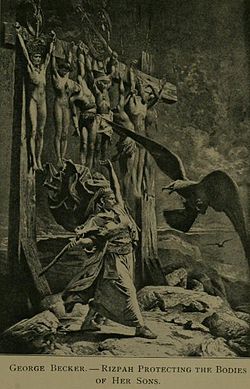Rizpah

Rizpah (riz'-pa, "coal", "hot stone") was the daughter of
After the death of Saul, according to the Bible,
A famine lasting three years hit Israel during the earlier half of David's reign at Jerusalem. God revealed that this calamity happened because of "Saul and for his bloody house, because he slew the Gibeonites." The Gibeonites were not Israelites, but the remnant of the Amorites, which Saul pursued from within Israel. David inquired of the Gibeonites what satisfaction they demanded, and was answered that nothing would compensate for the wrong Saul had done to them but the death of seven of Saul's sons.(2 Samuel 21:1–6)
David accordingly delivered up to them the two sons of Rizpah and five of the sons of
British rabbi Jonathan Magonet has described Rizpah as "every mother who sees her sons killed before their time for reasons of state, be they in time of peace or in war. All that remains is for her to preserve the dignity of their memory and live on to bear witness and call to account the rulers of the world".[2]
References
- ^ "www.Bibler.org - Dictionary - Rizpah". Retrieved 2012-10-29.
- ISBN 0-334-00102-1.
![]() This article incorporates text from a publication now in the public domain: "Rizpah". Easton's Bible Dictionary. 1897.
This article incorporates text from a publication now in the public domain: "Rizpah". Easton's Bible Dictionary. 1897.
